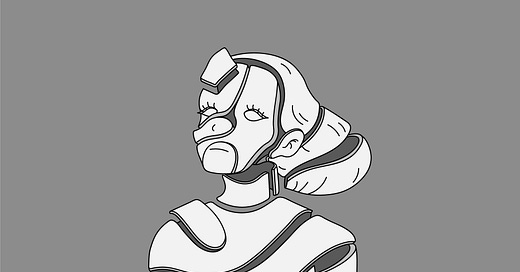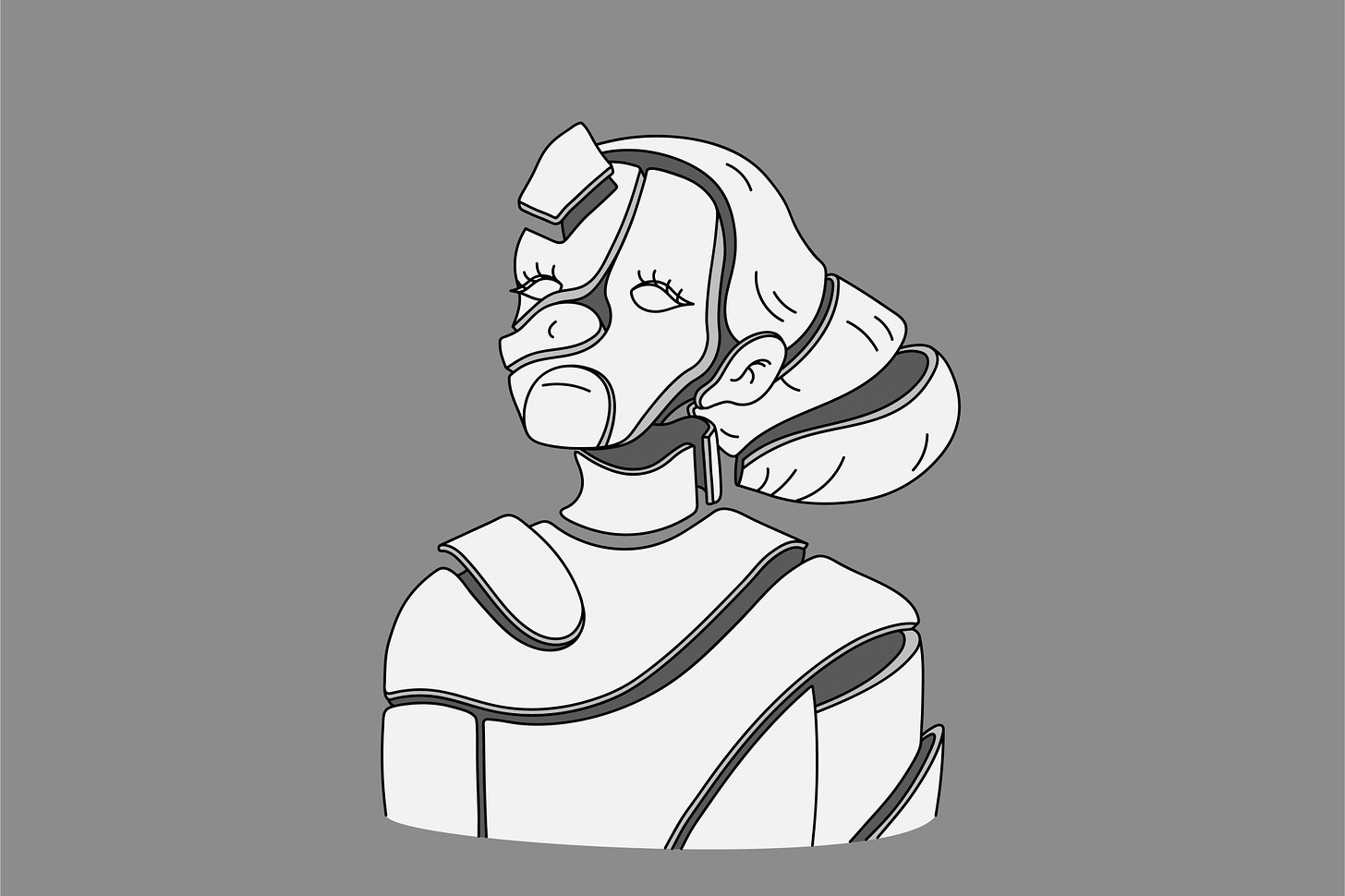When we first join online chronic illness spaces, there’s a new shared language that we learn: “warrior”, “zebra”, and “spoonie”, to name just a few.
They become shorthands, new ways of identifying ourselves and other people who are experiencing similar things. They’re as ubiquitous as the word “journey”, which is probably my personal pet peeve, as literally everything these days seems to be a bloody journey.
In some cases, they have helpful connotations. For example, “zebra” comes from the aphorism “when you hear hoofs, think horse, not zebra” - a reminder that a patient is more likely to have a common diagnosis than a rare one. But what happens when you have one of those zebra conditions? You become the zebra.
The term “spoonie” took off from Christine Miserandino’s “Spoon Theory”, a popular way of explaining energy limitations and management in chronic illness. It was something that I found extremely helpful when first trying to understand and share with others why I couldn’t do as much as everyone else.
“Warrior” is slightly different. It’s often a way for people to acknowledge what feels like the ultimate fight when they’re sick. It’s a way to validate the sense of struggle, the pain and the anguish of trying to manage an often unmanageable condition, and that gives them strength.
For the sake of this issue, I’m lumping all three together, but I kind of view “warrior” in a different way to the others.
That being said, today I want to briefly touch on some thoughts regarding language in chronic illness spaces, and a few terms I don’t particularly connect with and why.
Of course, all of this is individual. A lot of people love this language, identify with it, and find a lot of strength in it. If that’s you, live your best warrior zebra spoonie life! I’m not here to judge.
I just wanted to share how I feel. This is, after all, my newsletter.
First, let’s make it clear that I have probably used all these words at some point over the years. I genuinely don’t remember. I still use #spoonie on Instagram to try and get my posts seen by relevant people, but that’s about it.
I think, in many cases, there are words that if you read them enough times in contexts that apply to you, you just naturally start to use them, whether you consciously think about it or not. I know that in recent years I’ve had to request several times for people not to use the term “chronic illness warrior” in relation to me.
When it comes to the others, I don’t necessarily have problems with the words in and of themselves. If that’s how you want to self-identify, go for it. If it helps you to understand yourself and your condition - all power to you!
But it’s worth remembering that we all change over time, and something that connects with us at one point in our lives may feel cringey, inaccurate or just plain wrong to us at others.
This is the nature of getting older, of having more life experience, and just…changing. It’s the most natural thing in the world, which is why I also think it’s important to recognise that just like our illnesses ebb and flow, so does how we think about them…and ourselves in relation.
One of the interesting things about this kind of language is that it’s also one that forms connection and belonging. If we can identify as a spoonie zebra, we’re not alone. We’re part of a group of other people who are more likely to understand - something vitally important for those living with isolating, under-researched, barely-treated, and often disrespected conditions.
The primary problem I have is with a lot of what feels to me like infantilising rhetoric that comes from organisations set up to support people with long-term health conditions. I don’t really want to “wear my stripes” and drape myself in zebra print, thank you. It’s a level of cutesy performativity that makes me uncomfortable.
And I also wonder whether these cutesy terms also serve as a way of talking about the disability that comes with chronic illness without exploring or engaging with wider disability discourse. After all, most people with so-called “invisible conditions” often don’t even think that they can be considered disabled in the first place. But that’s just something that literally popped into my head, so I’ll probably have to think more on that before writing about it!
When it comes to the whole warrior thing…oy. Honestly, every time I wrote about this on Instagram I would brace for an influx of people getting very annoyed with me.
I sometimes get frustrated at the amount of disclaimers I use in the hope that won’t happen, but I think it’s really important to remember that just because one person does not feel the same way as we do, it doesn’t invalidate our beliefs or experience. There is room for everyone.
Oh god, that was another bloody disclaimer wasn’t it.
Inherent in the warrior narrative, and other militaristic terminology, is that an illness or disability is something that people can beat. They can win if only they fight hard enough.
But, as anyone who has tried to cure themselves of a lifelong chronic illness can tell you, it’s just a lot more nuanced than that.
The fight is never fair. So many of these conditions are simply out of our control, and in the case of chronic illness (note the word chronic) what exactly does winning look like, anyway?
More often than not it's the idea of a cure, which in most cases does not exist. And what does this say to people who are desperately unwell and cannot “fight”? That it's their fault? That they're not trying hard enough?
“Cognitive linguistic research suggests that those engaged in a ‘fight’ against illness express more anger and animosity toward their bodies, feel a greater sense of blame and failure when they fall ill and even possibly feel more fatigued physically by the perceived turmoil of treatment. Additionally, the ‘fight’ metaphor for illness has been linked to greater social stigma and discrimination.
Sometimes ‘fighting’ an illness can feel empowering, as though it gives us a sense of strength and victory, but with underlying connotations of violence and death as the outcome, it has a problematic effect on those struggling with chronic conditions that are impossible to ‘defeat.’
Some better alternatives might be ‘to manage,’ ‘to cope,’ ‘to adjust to.’ Everyone has a right to choose how they want to frame their experience which deserves to be respected, but just be mindful that not everyone wants to ‘fight.’”
Living with chronic illness is not a choice. Getting on with our lives the best we can is just something we all have to...do…because we don’t have any other choice.
I can see why the warrior narrative is compelling for people because the process of even getting through the day can feel like such a challenge to overcome and something to be celebrated.
But to me that's not a battle. I don't find that inherently 'brave' or 'inspirational'. It just is what it is. It's my normal. It’s a shitty normal, but it’s normal all the same.
I find it exhausting to live my life as if it's a war. I spent so long fighting my body, trying to 'win' by getting better. To prove I was worthy to myself and others. But I didn't win, and I only ended up hurting myself.
But that doesn't mean that I've given up. Some days we have to try harder than others. Some days we literally can't try. And that's ok.
I suppose moving away from the fight narrative played a role in helping me accept my reality instead of chasing after an unspecified future, and opened the door for me to safely and realistically find way more things in my life that this constant war I was fighting didn't allow space for.
Hey - that’s kind of the point of this whole newsletter!
I think what this ultimately comes down to for me is being able to recognise the reality of my situation. To accept that this is just my deal. I don’t need cutesy names or to act in a certain way to be part of a wider community.
As a friend of mine said via WhatsApp when we were talking about this topic yesterday:
“For me personally, the biggest and most transformative change to my mindset has been accepting the word disabled. I'm no longer constantly fighting to be well and be a warrior and pretending I'm able to live my life in the same way as before.
Using Disabled has allowed me to find peace and live with it not against it. It has helped me accept and ask for accommodations and help”.
As I was writing this issue, I came back over and over again to the question of self-definition and chronic illness, and that’s something I want to explore in more detail in the next few weeks.
As for today, I think I’ll leave it there. Thanks for using your ‘spoons’ to read this.
If you haven’t caught my latest work, here’s what you’ve missed:
An issue on how I manage pacing in practice, and a podcast episode about disabled people in Ukraine.






Worth the spoons.
1) This helped me think about why I don’t identify with the term “survivor” in terms of trauma (even though I support anyone choosing to use it). I’m not washed up on a beach or pulled out of wreckage: I’m coping, processing, changing. This is my normal.
2) I recently called myself a “Guinea pig” as I’m trying some off-label medications for fatigue that are making me feel awful; a friend gently suggested “co-investigator” instead, which made me feel more empowered to own my experience and ask my doctors to rethink the meds.
3) I’m sure you’ve read it a million times, but Sontag’s Illness as Metaphor has tons on the warrior/battle metaphor and how it relates to broader socio-economic values around war.
4) I like your language shift from cutesy/battle-y to straightforward: “disabled,” “managing.” I’ve been thinking about alternative metaphors for living with illness that are not your typical “kingdom” (why does every recent chronic illness memoir have kingdom in the title?) or “war.” I love gardening and find helpful analogies in that practice for the multifaceted experience of disability/chronic illness. Pruning, composting, environment, failure, adapting, etc.
Ok, essay done. Thank you for such a thinky piece! Now for a rest.